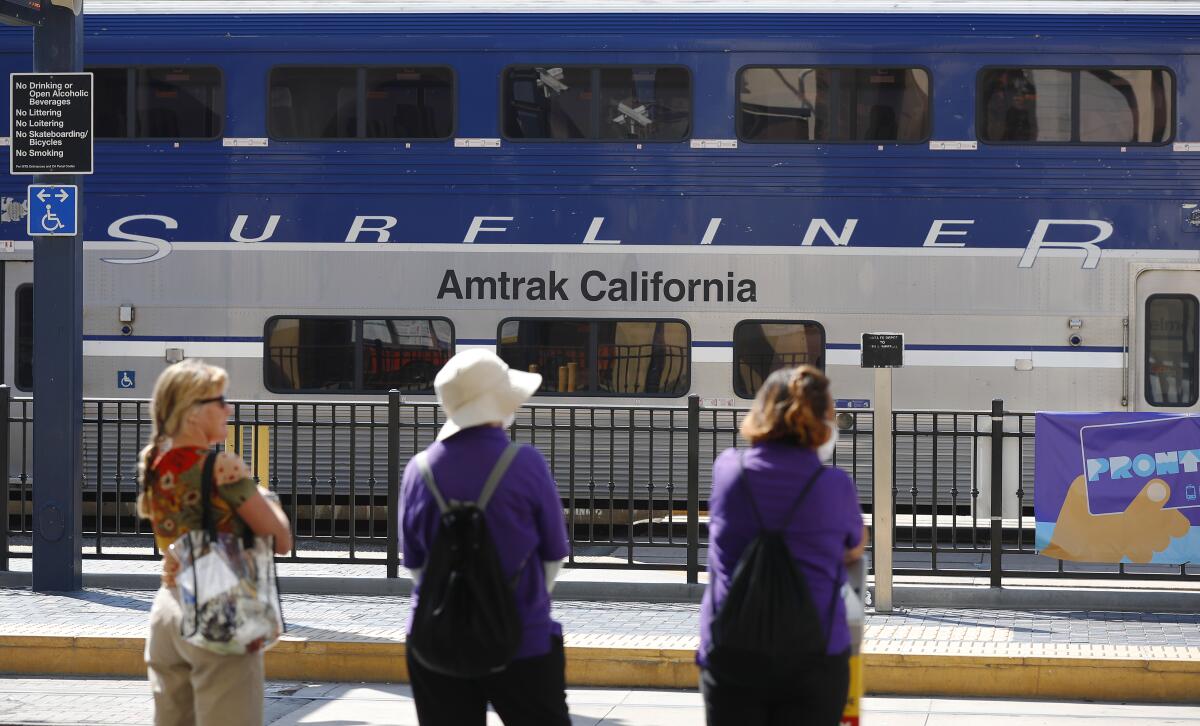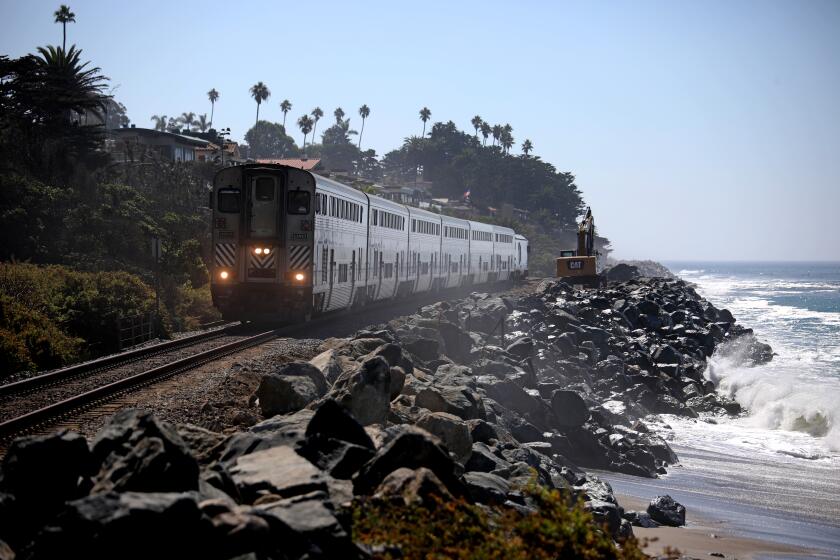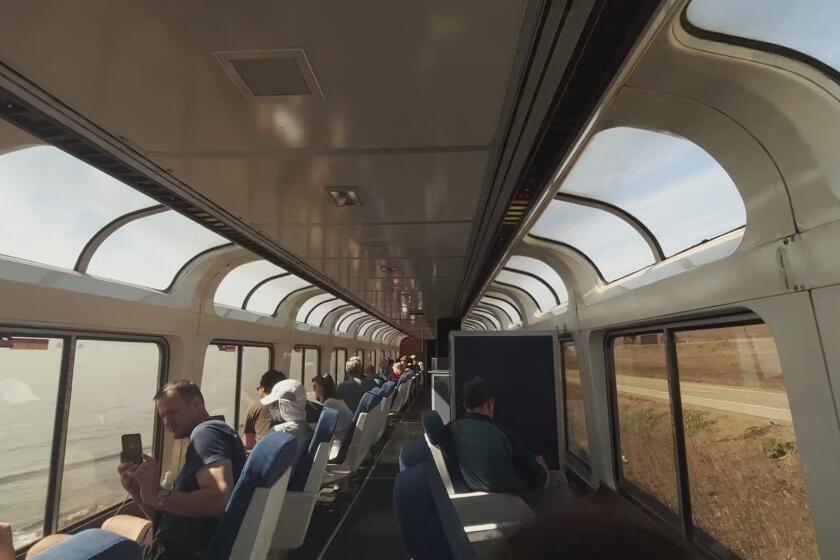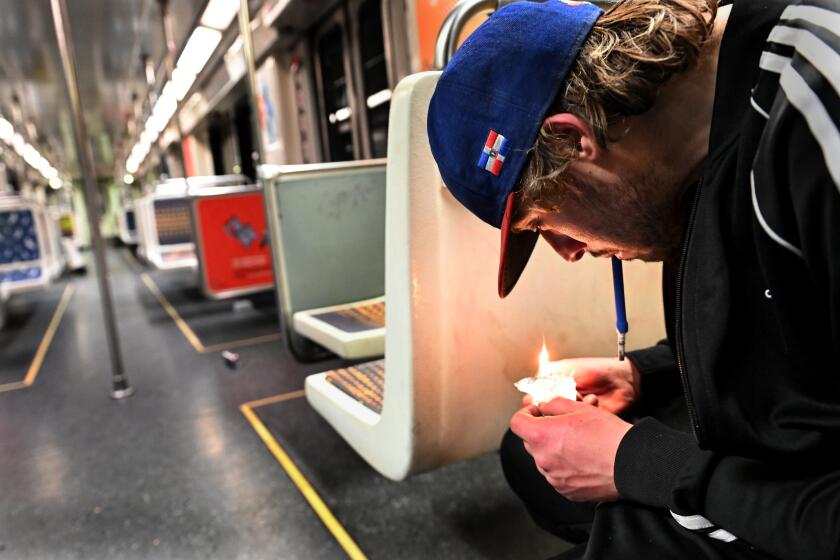Metrolink, Amtrak to resume full service from Orange County to San Diego County next week

- Share via
Full passenger service between San Diego and Orange counties is expected to resume next week after a nearly six-month suspension to stabilize a landslide in San Clemente, transit officials said Monday.
Amtrak’s Pacific Surfliner trains will return to full service through San Clemente on April 17, with 10 round trips each day between Los Angeles and San Diego. The bus connection between Oceanside and Irvine used during the stabilization project will no longer be required.
Metrolink plans to resume seven-day-a-week rail service to Oceanside, along with all regular passenger service along its Orange County and Inland Empire-Orange County lines through San Clemente, according to the Orange County Transportation Authority.
“I am very excited about Metrolink resuming service to and from Oceanside,” said Metrolink board Chair Larry McCallon, who is also the mayor of the city of Highland in San Bernardino County.
“I know the residents of the Inland Empire are looking forward to again taking the train to the beach,” McCallon said in a news release. “I encourage everyone to return to using our rail service to and from the beach areas as the nice weather returns to Southern California. I want to thank our partners at OCTA for their diligence and coordination as we both worked toward ensuring the continued safety of our rail service.”
Officials with Metrolink are still responding to recent movement detected in the railway’s foundation near San Clemente after Tropical Storm Kay.
Weekend Amtrak service was restored in February, and limited BNSF freight service has continued throughout the construction. The coastal rail route through San Clemente is the only passenger and freight train link between San Diego and the rest of the United States.
All passenger service was suspended Sept. 30 after inspectors discovered a section of the railroad tracks, on a slope loosened by rain and beach erosion, had moved a total of about 28 inches toward the ocean during the previous year at a rate between 0.01 inch and 0.04 inch per day.
OCTA’s Metrolink trains, which normally stop at the Oceanside Transit Center, traveled no farther south than the San Clemente pier during the stabilization project.
“The reopening of the tracks in San Clemente restores vital intercity rail connections between San Diego, Los Angeles, Santa Barbara and San Luis Obispo,” said Jason Jewell, managing director of the LOSSAN Rail Corridor Agency. “We thank our customers for their patience during this extended construction period and look forward to welcoming them back next week.”
Perhaps you’ve come across this popular train on TikTok, where people rave about its gorgeous observation cars. Here’s what the ride in coach is really like.
Crews will finish installing the second row of grade beam panels and ground anchor tiebacks this week that are stabilizing the privately owned hillside next to the track.
The construction has stopped movement of the track, OCTA officials reported during Monday’s OCTA board of directors meeting.
Remaining construction activities include cutting, capping and covering with shotcrete all tiebacks, installation of a trench drain system, restoration of the slope and fencing, and revegetation, according to the report. That work is expected to continue through June.
“This emergency work has posed an unprecedented challenge, especially with the heavy rainfall this season, and we’re very pleased to announce that passenger service can safely resume on this key stretch of Southern California rail,” said OCTA Chairman Gene Hernandez, who’s also the mayor of Yorba Linda. “We greatly appreciate the public’s patience and their understanding that ensuring passenger safety is always the first priority.”
Commuters have abandoned large swaths of a Los Angeles Metro train system plagued by crime and the scourge of drugs.
The latest forecast for the cost to complete the stabilization project is $13,700,600, according to an OCTA staff report.
The transportation authority also will have to make as-yet undetermined annual lease payments to the State Lands Commission for the use of land below the high-tide line as part of a rock revetment. There also could be additional costs for the use of private rights-of-way, permit fees and environmental mitigation.
More to Read
Sign up for Essential California
The most important California stories and recommendations in your inbox every morning.
You may occasionally receive promotional content from the Los Angeles Times.














